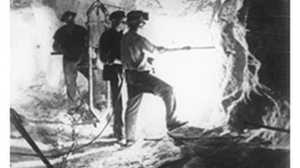Winston Churchill (1874-1965)

Together with U.S. president Franklin Roosevelt and Soviet premier Joseph Stalin, British prime minister Winston Churchill led the Allied armies to victory over Adolf Hitler and the Axis powers in World War II.
Soldier and Politician
Admitted to the British military academy at Sandhurst after two failed attempts, Churchill entered the army as a cavalry officer and soon saw three campaigns in Cuba, India, and Sudan. He later wrote his mother that he "never felt the slightest nervousness. [I] felt as cool as I do now." But while fighting engaged his energies, politics consumed him. In 1901 Churchill entered Parliament at age 26. By the outbreak of World War I, he was political head of the Royal Navy, whose failure at Gallipoli in 1915 forced his resignation. He remained a vocal member of Parliament for the next 25 years, but Churchill would not return to prominence until the rise of the Nazis. In 1935 he warned the House of Commons of the importance of "self-preservation but also of the human and the world cause of the preservation of free governments and of Western civilization against the ever-advancing sources of authority and despotism." He stood out as a man England could trust in the face of fascism.
The Nazis reviled him. Minister of Public Enlightenment and Propaganda Joseph Goebbels wrote many articles and diary entries disparaging Churchill. In a January 1941 article entitled "Churchill's Lie Factory," Goebbels wrote: "There is no point to debating Mr. Churchill about English ship losses or the damage caused by German air attacks. He follows the time-honored British policy of admitting only that which is impossible to deny, then cutting it in half, while at the same time doubling or tripling the enemy's losses. This balances the accounts. The astonishing thing is that Mr. Churchill, a genuine John Bull, holds to his lies, and in fact repeats them until he himself believes them." (Goebbels himself was a master of the "big lie" technique.) Churchill was "the first violin in the hellish concert that the whole demo-plutocratic world is playing against the Axis powers," according to Goebbels.
International Statesman
Following the Nazi occupation of France, Britain, in Churchill's words, "stood alone" under constant German air attack and threat of invasion. But from the outset, Churchill had rested his hopes on a U.S. intervention. On December 7, 1941, Japan's attack on America's Pacific fleet at Pearl Harbor justified his hopes. America's entry into World War II marked the high point of Churchill's statesmanship. His personal relationship with President Roosevelt eventually became a war-winning alliance. Over the course of the war, they exchanged thousands of messages and telephone calls. Churchill often visited the White House during the war, staying two and three weeks at a time. The two men met in person nine times, including two famous meetings with Joseph Stalin at Teheran and Yalta that initiated a new form of international relations called "summit diplomacy." The degree of cooperation between the British and American governments during World War II was unparalleled.
A Literary Legacy
When the war was over, Churchill was seen as a great wartime leader, but not the man to establish a better Britain during peacetime. He lost power in the 1945 post-war election, but returned for a final stint as prime minister at age 77. His literary output, which included a history of World War I and his memoir of World War II, earned him the Nobel Prize for Literature and insured that his name would never be forgotten.







